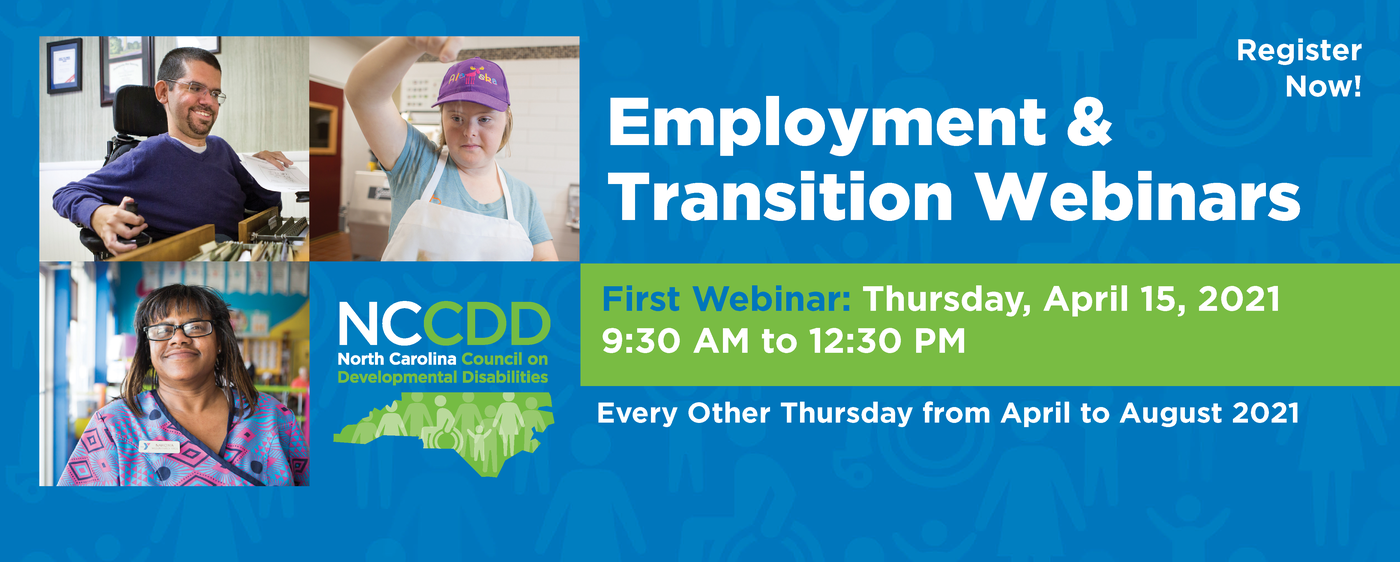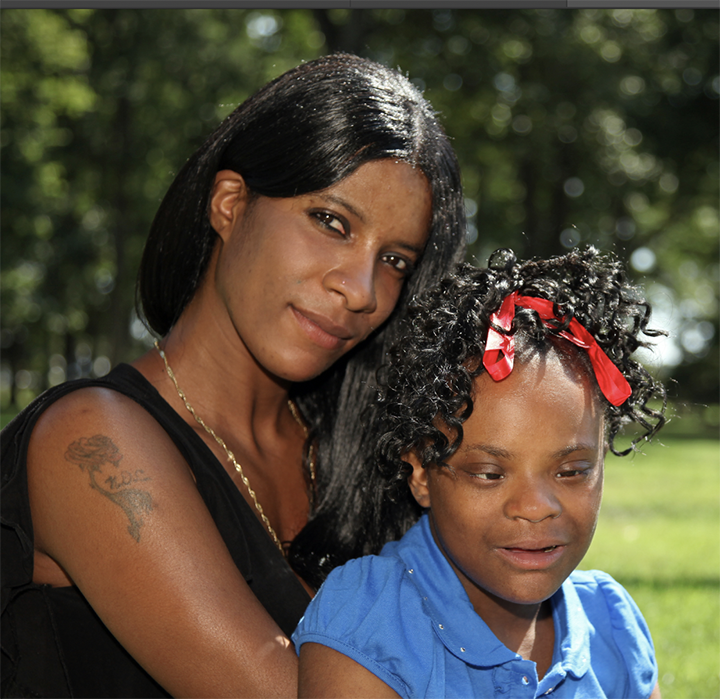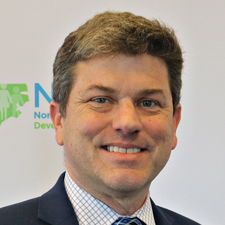April 2021 - Highlights and Hot Topics

Letter from the Executive Director
A Busy and Important Time
We seem to be everywhere – although we are still physically distant. The North Carolina Council on Developmental Disabilities (NCCDD) has been actively promoting Developmental Disabilities Awareness, the needs of those on the Registry of Unmet Needs, and employment for people with disabilities. But that’s not all! We will also be participating in the Disability Policy Seminar and helping to promote an upcoming education series for the Latinx/Hispanic Intellectual and other Developmental Disabilities (I/DD) community. Please keep up with our newsletter, our public website calendar, and our policy updates to stay informed about all that is happening.
The Council celebrated DD Awareness Month at the end of March with a fantastic panel of self-advocates, including three self-advocates from NCCDD. What made the event fantastic was that it was hosted by Human Resources leaders at the City of Raleigh. The Council was able to discuss and show the value of individuals with disabilities to employers and employees in Raleigh. You can read more about that event and see pictures here.
On April 8, the Council hosted a screening and panel discussion of the film 6,000 Waiting. The film is about three individuals on Georgia’s intellectual and developmental disabilities (I/DD) waiting list. The event included live stories and messages about North Carolina’s Registry of Unmet Needs. Read further down for more about what is happening at the General Assembly related to the Registry and to learn more about this important event.
NCCDD has also started a series of biweekly disability employment webinars, which are being led by a national expert on employment and people with disabilities. You can register and find out more about the series here.
It is a critical time for the I/DD community in North Carolina. We look forward to being part of more events and opportunities to make a difference for our community. Please join us!
Talley Wells, Executive Director
Public Policy Update as of April 14

FEDERAL
President’s Budget
On Friday, April 9, 2021, the Office of Management and Budget (OMB) released an overview of the President Joe Biden’s appropriations proposals for Fiscal Year (FY) 2022 discretionary funding and some further details on priorities within individual agencies.
The President's proposal is a 16% increase in non-defense discretionary spending over FY 2021, and includes several lines of interest to the disability community:
- Education
- ~$15.5 billion for the Individuals with Disabilities in Education Act (IDEA) (+ $2.6 billion)
- Health and Human Services:
- ~$8.7 billion for Centers for Disease Control and Prevention (CDC) (+ $1.6 billion)
- ~$51 billion for National Institutes of Health (NIH)
- ~$551 million for Home and Community-Based Services (HCBS)
- Social Security Administration:
- ~$14.2 billion (+ $1.3 billion)
The President's budget is typically considered an opening bid in negotiations with US Congress.
Infrastructure
President Biden released the American Jobs Plan, a proposal for infrastructure reform and economic recovery. The proposal is a framework that will need to be translated into legislative text and passed through Congress. Priorities in the disability community that may be considered as part of the legislative package include:
- Ending subminimum wages and modernizing disability employment supports to allow for competitive, integrated employment;
- Continued expansion of access to HCBS for people with disabilities, ending waiting lists for services and ensuring a stable, valued direct support workforce;
- Meeting the educational needs of students with disabilities in PreK-12 and higher education; and
- Ensuring all modernization of physical and virtual infrastructures are accessible (Infrastructure means the buildings, roads, bridges, power lines, and other things our country needs to work every day. It can also include systems that make our country work like schools, healthcare, and other government services.)
State Update
Governor Roy Cooper released his proposed two-year budget which calls for spending $27.4 billion in the first year, eight percent higher than his 2019 proposal, and which includes Medicaid Expansion and pay raises for teachers and other state employees.
The following are items from the proposed budget that are related to people with I/DD:
- Funds for 520 Innovations waiver slots
- 60 million to address direct care and early childhood workforce issues (workforce funds are across children, aging and disabilities)
- 30 million for increased housing and employment for people with disabilities
- 10 million in funds for individualized early intervention
- 305 million for resources for at risk children, including special education (removes funding caps, increases allocations)
- 5 million for reducing the implicit bias of students of color and students with disabilities in early education
- 5 million for transportation through the Rural Operating Assistance Program (ROAP) which supports transportation for those with disabilities (these were the funds that were cut last year).
- Funds for benefits counseling, and adaptive equipment through Vocational Rehabilitation.
The release of the Governor’s budget was the first step in the budget process. The Senate is now working on their budget. Once the Senate passes a budget, it will be sent to the House where their budget will be approved. A conference committee will be appointed to work out differences.
Bills that may impact people with I/DD:
HB 249 Children with Disabilities Funding Formula: HB 249 would direct the Department of Public Instruction to study the funding formula for children with disabilities and special education in public schools and consider a model that would base funding on the severity of disability. The bill also increases the cap on the current funding formula for children with disabilities from 12.75% to 13%. The study report would be due to legislative education committees by February 15, 2022.
The funding formula for special education has been a concern for a long time. A plan to address this could improve education supports for children with I/DD.
North Carolina Innovations Waiver Act of 2021: Bills were filed in the House (H389) and Senate (S350) that would fund an additional 1000 Innovations home and community waiver slots, including 200 set aside for the development of a tiered waiver to support people with a lower level of need. The bill also requires NC DHHS to convene a stakeholder group to develop a ten-year plan to address the Registry of Unmet Needs, also known as the waiting list for those waiting for services.
It is hoped that funding for 1000 Innovations waiver slots will be in the Senate budget when it is released.
Reduce Regulations to Help Children with Autism: This bill (S103/H91) will allow behavior analysts to obtain NC licensure and provide services on their own. Both the House and Senate passed this bill and after the approval of some technical changes, it is expected to go to the Governor for signature.
This legislation will increase access to early intervention for children with autism.
Police Notice of Person with I/DD in Vehicle: This bill is a proposal at this point. It would direct the Division of Motor Vehicles to develop a designation for driver’s licenses that may be granted upon request to a person with an intellectual or developmental disability and to appropriate funds for that purpose.
The Council is in discussion with bill sponsors about this proposed bill.
Medicaid Transformation
Medicaid Transformation continues to move forward. The Standard Plan is scheduled to launch on July 1, 2021. Letters have been sent to beneficiaries who need to enroll in a plan. These integrated managed care products called Standard Plans will cover physical health, behavioral health and pharmacy services to many North Carolinians who receive their healthcare through Medicaid. The open enrollment is scheduled to run through May 15, 2021.
- People who currently receive services through the Innovations Waiver, the TBI waiver, or non-Medicaid state funds will continue to receive their services and supports through the current system. They should not enroll in the Standard Plan as none of these services will be provided through the Standard Plan.
- People who are on the waitlist will not be assigned to the Standard Plan, but may choose to enroll in the Standard Plan if they feel some of the offered benefits may be helpful. They will not lose their place on the waitlist and can come back to the Tailored Plan. Again, if they are receiving any services through the LME/MCO, these will not be available in the Standard Plan.
Behavioral Health I/DD Tailored Plans are specialized managed care focusing on the needs of individuals with significant behavioral health disorders, intellectual and developmental disabilities (I/DD), and traumatic brain injuries (TBI). These plans are scheduled to begin in July 2022 and will cover a more robust package of Behavioral Health, I/DD and TBI services compared to Standard Plans. The LME/MCOs submitted applications to provide these plans and the Department of Health and Human Services is currently reviewing these applications.
NCCDD Launches 2021 Employment and Transition from School to Adult Life Webinars
 NCCDD recently launched its 2021 Employment and Transition Webinars to educate and inform stakeholders about a statewide system that provides and sustains integrated employment for all North Carolinians living with a developmental disability, regardless of complexity or needed level of support.
NCCDD recently launched its 2021 Employment and Transition Webinars to educate and inform stakeholders about a statewide system that provides and sustains integrated employment for all North Carolinians living with a developmental disability, regardless of complexity or needed level of support.
The webinars will be held every other Thursday. They started April 15 and will continue until August 19, 2021 from 9:30 AM - 12:30 PM via Zoom. Each webinar will include breaks and time for Q&As with leading experts in employment and transition planning for people with intellectual and/or other developmental disabilities.
- April 29 - Charting the Life Course (An Evidence-based best practice endorsed by the US Administration for Community Living) and Person-Centered Thinking
- May 20 - Transition from School to Adult Life of Post-Secondary Education, Competitive Integrated Employment, and Integrated Community Living
- May 27 - The Basics of Supported Decision Making: It’s Your Choice
- June 10 - The Role of Assistive Technology and Devices in School, Employment and Community Living
- June 24 - Building Meaningful Lives with an Integrated, Meaningful Day
- July 8 - Think College and Post-Secondary Education
- July 22 - Customized Employment with Fidelity
- August 5 - Benefits Planning and Creating an ABLE Account
- August 19 - Putting All the Pieces Together for North Carolina Employment First
The webinar is open to all Employment First stakeholders, transition professionals, self-advocates, families, job coaching/CRP staff, and MCO staff. Registration is required as space is limited.
To learn more and to register, visit NCCDD's website.
Movie Event Highlighted Needs of those On Waiting Lists
 NCCDD and First in Families North Carolina hosted a virtual screening of the movie, 6,000 Waiting, a 30-minute documentary produced by the Georgia Council on Developmental Disabilities on Georgia's Medicaid waiting list.
NCCDD and First in Families North Carolina hosted a virtual screening of the movie, 6,000 Waiting, a 30-minute documentary produced by the Georgia Council on Developmental Disabilities on Georgia's Medicaid waiting list.
The film focused on three individuals -- Ben, Noah, and Nick -- who struggled with waiting to receive Medicaid Waiver services. While the film was about three individuals on the 6,000 person waiting list, North Carolina has similar individuals on its 15,000 person waiting list, which is called the Registry of Unmet Needs.
The event started and ended with music from NCCDD Policy Education Coordinator Chris Hendricks. Following the movie, Matt Potter, a self-advocate, and Paula Salmonson, a parent of a young adult with a developmental disability, shared their experiences waiting for services in North Carolina.
The event ended with the two Legislative Chairs of the state’s I/DD Caucus, Representatives John Bradford and Zack Hawkins, discussing current legislation related to the I/DD community. This includes House and Senate Bills proposing to fund 1,000 new Innovations Waivers and the development of a 10 year plan to address the Registry of Unmet Needs.
The event is one part of a larger effort by NCCDD to raise awareness of the needs of the I/DD community related to the Registry. You can watch the music and speakers from the event on the NCCDD website. You can learn more and find additional showings here: https://www.6000waiting.com/
RUN: An Education on NC’s Medicaid Waiting List, Part Two
The Registry of Unmet Needs (RUN) is the Innovations Waiver waiting list in the state of North Carolina. NCCDD is providing a series of articles on RUN to educate and inform about what it is, where it stands today, and what you can do to impact its effectiveness and growth in the future. 
As we wrote last month, the Registry of Unmet Needs (RUN) currently has 15,000 North Carolinians with intellectual and other developmental disabilities (I/DD) on it, each waiting to be next to receive up to $135,000 in funds to pay for supports and services that will allow them to live as independently as possible in the community of their choice.
The biggest challenge in North Carolina is the average wait to move up on this first come – first served list, which is approximately eight years. People wonder why they, with this extensive wait, should put their name on the list and below we share a few reasons about the importance of signing up for RUN as quickly as an individual with I/DD in North Carolina can.
First of all, RUN is just one method of assistance an individual with I/DD can apply for to get help with their needs. Looking at what individuals on RUN need allows organizations to offer people other services that are state-funded, Medicaid-funded, in-lieu-of-services options and B3 services in the Medicaid state plan to help individuals remain in their homes.
In addition, the legislature – which determines the funding for RUN which impacts the number of innovation waivers that can be offered – looks at how many people have signed up on the registry and what services are needed. This helps the state determine how much of the budget can be put towards needed waivers.
In 2020, the NC legislature did not add any additional funds for more waivers. However, in the current proposed two-year North Carolina budget, Governor Roy Cooper has included funds for 520 Innovations Waiver slots. In addition, there is currently a bill filed that requires the North Carolina Department of Health and Human Services to convene a stakeholder group to develop a 10-year plan to address the Registry of Unmet Needs.
Local Management Entities – Managed Care Organizations (LME-MCOs), who manage the Innovation Waivers for RUN, also look at the list of needs of those on the registry and adjust or add services they offer based on this information.
Wait lists in other states have varying lengths of time people stay on the list before receiving assistance. A recent film, “6,000 Waiting” tells the powerful stories of three Georgians with developmental disabilities whose lives are significantly impacted by the staggering lack and complexity of state Medicaid waiver funding. North Carolina Council on Developmental Disabilities (NCCDD), along with First in Families North Carolina and the Georgia Council on Developmental Disabilities, recently hosted a showing of this film. You can view a video of the event here.
As this series unfolds, we will address what to expect when calling to be placed on RUN, what individuals and families can do during their wait, the importance of legislative advocacy, and more.

